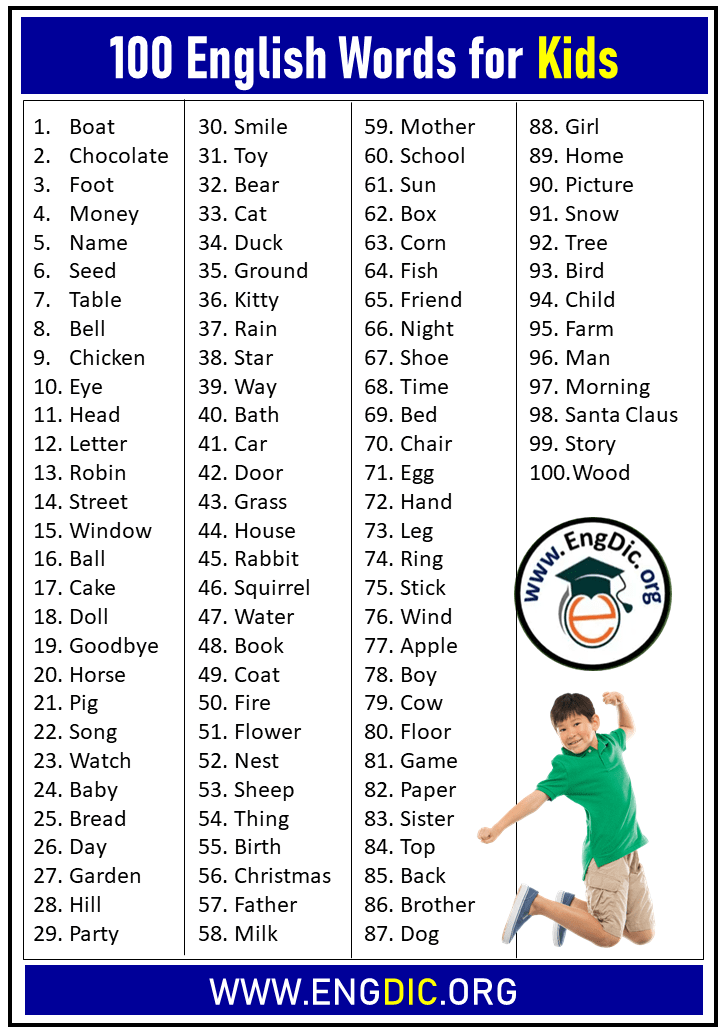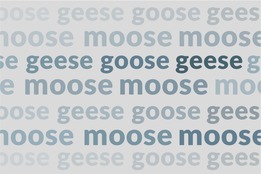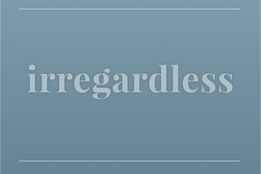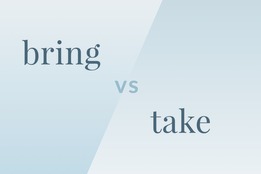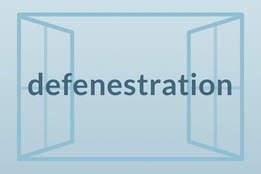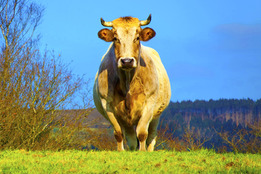100 English Words for Kids
As a parent, you want your child to succeed in school and life. A great way to start is by teaching them English. It’s the language of opportunity. But where do you begin? There are over 600,000 words in the English language! We’ve compiled a list of 100 essential words for kids. Learning these basic words will help your child jumpstart their English education and build a strong foundation for success.
So, here is the list of the top 100 words for kids:
English Words for Kids
- Boat
- Chocolate
- Foot
- Money
- Name
- Seed
- Table
- Bell
- Chicken
- Eye
- Head
- Letter
- Robin
- Street
- Window
- Ball
- Cake
- Doll
- Goodbye
- Horse
- Pig
- Song
- Watch
- Baby
- Bread
- Day
- Garden
- Hill
- Party
- Smile
- Toy
- Bear
- Cat
- Duck
- Ground
- Kitty
- Rain
- Star
- Way
- Bath
- Car
- Door
- Grass
- House
- Rabbit
- Squirrel
- Water
- Book
- Coat
- Fire
- Flower
- Nest
- Sheep
- Thing
- Birth
- Christmas
- Father
- Milk
- Mother
- School
- Sun
- Box
- Corn
- Fish
- Friend
- Night
- Shoe
- Time
- Bed
- Chair
- Egg
- Hand
- Leg
- Ring
- Stick
- Wind
- Apple
- Boy
- Cow
- Floor
- Game
- Paper
- Sister
- Top
- Back
- Brother
- Dog
- Girl
- Home
- Picture
- Snow
- Tree
- Bird
- Child
- Farm
- Man
- Morning
- Santa Claus
- Story
- Wood
About The Author
Check List of Words For Kids Here
Why do you think words are so important in effective communication? It is important to understand the fact that meaningful sentences are made using proper words. Therefore, parents and teachers need to introduce words for kids that will improve all areas of communication. Without using appropriate words, it is difficult to interpret information. Kids at an early age start picking up words around them. This is the right age where they start developing curiosity to learn new words.
Initially, a list of words for kids should be considered which are easy and simple to understand in order to develop their language skills. However, it is necessary to teach words to kids that are essential for their communication. Before this, kindergarten spelling words will help kids to spell easy words in order to communicate with others.
Parents and teachers can prepare a list of words for kids that they think is appropriate for them to use in everyday life. At an early age, you should use words for kids in order to improve their vocabulary skills. It not only helps in developing language skills but also improves grammatical concepts for educational development.
To understand better, cvc word games for kids will be a great help to learn basic grammar for reading and writing. Teaching a list of words for kids takes a lot of effort. Therefore, incorporating innovative and creative activities or games can boost their understanding of words and eventually improve their language skills. Apart from this, color by sight words can inculcate interests in learning new words with the help of attractive colors and themes.
List of Words For Kids
On the other hand, parents and teachers can focus on how to enhance their learning experience by teaching great words for kids.
Some of the list of words that kids can learn and develop their communication skills are as follows:
- Ch Words For Kids
- Compound Words for Kids
- Describing Words For Kids
- Halloween Words
- Multiple Meaning Words
- Opposite Words for Kids
- Ph Words For Kids
- Pictionary Words for Kids
- Positive Words for Kids
- Rhyming Words For Kids
- Rhyming Words Worksheet
- Root Words For Kids
- Summer Words
- Thanksgiving Words
- Valentine’s Day Words
- Th Words For Kids
- Vocabulary Words for Kids
- Wh Words for Kids
Words For Kids By Alphabet
- Words That Start With A
- B Words for Kids
- C Words For Kids
- D Words for Kids
- E Words For Kids
- F Words for Kids
- G Words For Kids
- H Words for Kids
- I Words For Kids
- J Words For Kids
- K Words For Kids
- M Words For Kids
- N Words For Kids
- O Words For Kids
- P Words For Kids
- Q Words For Kids
- R Words For Kids
- S Words for Kids
- T Words For Kids
- U Words For Kids
- V Words For Kids
- W Words For Kids
- X Words for Kids
- Y Words For Kids
3 Letter Words For Kids
- 3 Letter Words Starting with A
- 3 Letter Words Starting With E
- 3 Letter Words Starting With J
- 3 Letter Words Starting With I
- 3 Letter Words Ending In Y
- 3 Letter Words Ending in E
- 3 Letter Words Ending in C
- 3 Letter Words Ending With A
- 3 Letter Words Ending With H
- 3 Letter Words Ending in I
- 3 Letter Words Starting With Z
- 3 Letter Words Starting With V
- 3 Letter Words Ending In J
- 3 Letter Words Starting With U
- 3 Letter Words Ending in Q
- 3 Letter Words Ending With Z
- 3 Letter Words Starting With S
- 3 Letter Words Starting With Q
- 3 Letter Words Ending In O
- 3 Letter Words Ending In U
- 3 Letter Words Starting With O
Four Letter Words For Kids
- Four Letter Words Ending In A
- Four Letter Words Ending in B
- Four Letter Words Ending in C
- Four Letter Words Ending in F
- Four Letter Words Ending In H
- Four Letter Words Ending In I
- Four Letter Words Ending in J
- Four Letter Words Ending in O
- Four Letter Words Ending In Q
- Four Letter Words Ending In U
- Four Letter Words Ending In V
- Four Letter Words Ending in W
- Four Letter Words Ending In X
- Four Letter Words Ending in Z
- Four Letter Words Starting With C
- Four Letter Words Starting With F
- Four Letter Words Starting with S
- Four Letter Words That Start With A
- Four Letter Words That Start With B
- Four Letter Words That Start With D
- Four Letter Words That Start With E
- Four Letter Words that Start with G
- Four Letter Words That Start With I
- Four Letter Words That Start With J
- Four Letter Words That Start With K
- Four Letter Words that Start with M
- Four Letter Words that Start with N
- Four Letter Words that Start with P
- Four Letter Words That Start With Q
- Four Letter Words That Start With T
- Four Letter Words That Start With X
- Four Letter Words That Start With Y
- Four Letter Words that Start with Z
- Funny Four Letter Words
Christmas Words
- Christmas words that start with A
- Christmas Words that Start with B
- Christmas Words That Start With C
- Christmas Words that Start with D
- Christmas Words that Start with E
- Christmas Words that Start with I
- Christmas Words that Start with K
- Christmas Words That Start With L
- Christmas Words That Start With M
- Christmas Words That Start With N
- Christmas Words That Start With O
- Christmas Words That Start With Q
- Christmas Words That Start With U
- Christmas Words That Start With Z
Sight Words For kids
- What are Sight Words?
- Kindergarten Sight Words
- Preschool Sight Words
- First Grade Sight Words
- 2nd Grade Sight Words
- 3rd Grade Sight Words
- Color by Sight Words
Spelling Words For kids
- Kindergarten Spelling Words
- 1st Grade Spelling Words
- 2nd Grade Spelling Words
- 3rd Grade Spelling Words
- Hard Spelling Bee Words
- Easy Spelling Words
Great Words For Kids
Kids from an early age are given easy spelling words in order to learn the formation of meaningful sentences. For that, one should abide by the grammar rules for effective interpretation of information. Parents and teachers can conduct fun and entertaining activities to learn new words. Prior to this, kids should know what are sight words? These are the most commonly used words in the sentences such as are, is, to, at, the, by, we, here, etc. A list of words for kids are introduced in the form of worksheets, videos, charts, games, etc. With this, it is extremely easy for them to understand the meaning of words and know where to incorporate them while making sentences.
Kids are always curious to learn new words around them. They come up with words and ask questions associated with it. This develops critical thinking abilities among kids. They want to know everything related to the words. Moreover, it is important for them to explore words by involving themselves in some activities. For example, kids in general love to know about christmas or halloween words which brings a feeling of joy in them. Therefore, parents can introduce words related to the celebration or any specific content in order to increase their vocabulary.
Benefits of Using Words For Kids
Some of the benefits of using words for kids are mentioned below:
- Helps in cognitive development.
- Develops language and vocabulary skills.
- Helps in understanding frequently used words.
- Enhances learning experience.
- Improves writing skills and reading skills.
- Builds confidence among children.
- Improves pronunciation.
- Helps in writing meaningful sentences by using sight words.
- Improves spelling skills.
- Improves grammatical concepts.
- Helps in understanding the words and incorporating them in sentences.
- Develops problem solving and critical thinking skills among kids.
- Enhances creativity and mental stability.
- Improves academic performance.
Tips to Teach Words for Children
Some of the tips for kids to teach words in developing communication skills are mentioned below:
- Encourage the children to learn new words.
- Ask kids to repeat the words and its spellings for better retention.
- Motivate kids to learn words on a regular basis.
- Provide reading materials in order to come up with new words.
- Conduct innovative activities to come up with great words for kids.
- Include flashcards, images, graphics, worksheets etc to teach words.
- Teach difference between consonants and vowels.
- Develop spelling skills by making them regularly read and write.
- Understand the spelling rules in order to learn correct spellings of words.
- Include story and essay writing in their curriculum.
To learn words, parents and teachers need to focus on improving grammatical concepts among the children. Once they are acquainted with grammar, there will be a clear exchange of information without any misunderstanding. Kids at this age learn words that are easy and simple to understand. Make sure that there is no usage of jargon while communicating. Kids at kindergarten and preschools need extra attention in terms of spelling and pronunciation. Using great words for kids will make them feel positive about learning new things. However, there are also words that have multiple meanings associated with them.
For example, bark, can, right, bat, etc. These are similar words but with different meanings. Therefore, multiple meaning word games for kids will enhance their understanding of the difference in words.
To get more information, explore related articles on spelling rules, spelling games for kids, and reading games for kids here.
Frequently Asked Questions on Words For Kids
Why Are Words For Kids Important?
Words for kids play an important role in improving and developing their communication skills and vocabulary. A solid vocabulary help kids create new and simple sentences by using the right words. Learning new words supports children to generate creative ideas and improve their logical thinking capabilities.
How to teach new words for kids?
Teaching new words for kids play an important role in building their confidence and vocabulary. You can ask them to read a simple sentence or a paragraph aloud, initiate meaningful conversations, encourage them to name a few objects they use or see daily, like, books, trees, sky and many others.
How To Explain The Meaning Of Words For Kids?
Explaining the meaning of words for kids can be done in this way. You can let kids notice and read the word aloud. You can read along with them and mimic the sounds of animals and ask the kid to identify the animals. Also, repeat some words that are used regularly so that kids don’t forget them.
Ask the Editors
-
Weird PluralsOne goose, two geese. One moose, two… moose. Wh…
-
IrregardlessIt is in fact a real word (but that doesn’t mean …
-
Bring vs. TakeBoth words imply motion, but the difference may b…
-
DefenestrationThe fascinating story behind many people’s favori…
Word Games
-
Farm Idioms QuizIf you’ve got a pig in a poke — what exactly is a…
Take the quiz
-
Name That Hat!Time to put on your thinking cap.
Take the quiz
-
Name That ThingYou know what it looks like… but what is it cal…
Take the quiz
-
Spelling Bee QuizCan you outdo past winners of the National Spelli…
Take the quiz
Here we are going to look at the list of high frequency words for beginners to start their vocabulary learning. Before jumping into list let us see what these high frequency words are ?.
When you read so many text and come across same set of words, jumbled differently. Ever thought what these words which are popping up frequently called? Yes, these are called high frequency words.
Moreover, we have many texts, and each one a remix of high frequency words. Contrarily, these words are underrated that we live our life without noticing their importance. However the literary pieces without them would just be a dream. No matter how hard we try we cannot write without using them… the situation very much similar to our behavior towards people whose work we tend to leave unnoticed. Where in reality, it’s their work which is saving our life from falling apart. Surprisingly, these people are not from any distant land but the one’s we see everyday like the soldier, police, electrician and everyone who’s serving you for your betterment. (List goes on forever for everyone who you think is important… now.)
100+ High Frequency Words for Kindergarten
Therefore, with this purpose in our mind, let’s head towards a just world for both words and humans, because why no
| the | as | is | at | of | and | with |
| you | for | was | a | his | that | on |
| are | to | they | it | be | have | in |
| I | he | this | from | all | but | by |
| can | do | each | for | had | he | how |
| if | in | not | of | on | one | or |
| said | she | that | the | their | there | use |
| we | were | what | when | which | with | you |
| your | words |
High Frequency Words for 1st Grade
| a | came | had | make | people | ten | walk |
| all | can | has | many | play | than | want |
| am | come | have | me | please | thank | was |
| an | day | he | more | pretty | that | we |
| and | did | her | much | purple | the | were |
| any | do | here | must | put | them | what |
| are | down | hers | my | ran | then | when |
| as | eat | him | new | red | there | where |
| ask | eight | his | nice | run | these | which |
| at | find | how | nine | said | they | white |
| ate | five | if | no | saw | thing | who |
| away | for | in | not | say | this | why |
| be | four | into | now | see | three | with |
| because | from | is | of | seven | to | went |
| been | get | it | on | she | too | work |
| before | girl | jump | one | six | two | yellow |
| big | go | like | only | small | up | yes |
| black | going | little | or | so | very | you |
| blue | good | look | orange | some | soon | your |
| boy | great | other | our | out | over | green |
| but | by | brown | house | how | day | could |
| been | high | more | much | should | some | write |
2nd Grade High Frequency Words
| the | or | will | number | new | great |
| of | one | up | no | sound | where |
| and | had | other | way | take | help |
| a | by | about | could | only | through |
| to | word | out | people | little | much |
| in | but | many | my | work | before |
| is | not | then | than | know | line |
| you | what | them | first | place | right |
| that | all | these | water | year | too |
| it | were | so | been | live | mean |
| he | we | some | call | me | old |
| was | when | her | who | back | any |
| for | your | would | oil | give | same |
| on | can | make | now | most | tell |
| are | said | like | find | very | boy |
| as | there | him | long | after | follow |
| with | use | into | down | thing | came |
| his | an | time | day | our | want |
| they | each | has | did | just | show |
| I | which | look | get | name | also |
| at | she | two | come | good | around |
| be | do | more | made | sentence | form |
| this | how | write | may | man | three |
| have | their | go | part | think | small |
| from | if | see | over | say | set |
| put | kind | every | left | until | idea |
| end | hand | near | don’t | children | enough |
| does | picture | add | few | side | eat |
| another | again | food | while | feet | face |
| well | change | between | along | car | watch |
| large | off | own | might | mile | far |
| must | play | below | close | night | Indian |
| big | spell | country | something | walk | real |
| even | air | plant | seem | white | almost |
| such | away | last | next | sea | let |
| because | animal | school | hard | began | above |
| turn | house | father | open | grow | girl |
| here | point | keep | example | took | sometimes |
| why | page | tree | begin | river | mountain |
| ask | letter | never | life | four | cut |
| went | mother | start | always | carry | young |
| men | answer | city | those | state | talk |
| read | found | earth | both | once | soon |
| need | study | eye | paper | book | list |
| land | still | light | together | hear | song |
| different | learn | thought | got | stop | being |
| home | should | head | group | without | leave |
| us | America | under | often | second | family |
| move | world | story | run | late | it’s |
| try | high | saw | important | miss | afternoon |
Phew!, a long list has finally come to an end. However, there are many words which you’ll maybe notice now while reading and understand their importance. Also don’t forget the humans!
By Ashley Austrew
Vocabulary is one of the keys to literacy, and having a strong foundational vocabulary can help kids learn more and perform better across many different subjects.
Luckily, at Dictionary.com, we have customized word lists to help learners at every level improve their vocabularies, work on their spelling, and more. Getting ready for a new school year has never been simpler than with our easy-to-use digital flashcards, spelling tests, and word quizzes. The vocabulary lists below are specially prepared according to students’ needs at each grade level. Practice with your students for 10 to 15 minutes each day, try out our quizzes to see how you’re doing, and let us help get your child prepared to excel in the school year ahead.
Jump right into our library of grade-specific word lists right here, and then explore other fun topics to boost your knowledge.
Kindergarten vocabulary words and tips
In kindergarten, most kids are still laying the foundation for literacy. Some may be early readers, while others are still working on grasping the basics of phonics. At this stage, learning vocabulary typically means, for newer learners, sounding out and memorizing high frequency words and, for more advanced learners, decoding early multisyllabic words.
High frequency words are common words found in English, like the or and, that kids can learn to instantly recognize so they don’t have to sound them out every time. Sight words are similar, except sight words typically can’t be sounded out because they don’t follow common phonetic patterns. An example of this is the word could. In the case of sight words, kids typically just have to memorize them to make reading easier.
There are high frequency words and sight words at every grade level, but they hold extra importance for kindergarteners because they’re some of the very first words kids in this age group learn. To help support your kindergartener, be sure to read together daily. You can also take our kindergarten word quiz together to see how they’re doing. Here are some of the early high frequency and sight words they need to know:
- Kindergarten Vocab Word List 1:
- is
- the
- can
- see
- go
- it
- no … full list
- Kindergarten Vocab Word List 2:
- say
- ride
- how
- into
- call
- been
- she … full list
- Kindergarten Vocab Word List 3:
- big
- yes
- well
- look
- was
- went
- cat … full list
Is your kindergartner ready to see how much they’ve learned? Then take this quiz together!
First-grade vocabulary words and tips
In first grade, kids begin building on the strong literacy foundation that was created in kindergarten. They are still learning high frequency and sight words, but the words become more complex; for instance, they may have multiple syllables or silent letters. At this stage, most kids can read simple stories and talk to parents about what they read. They are also starting to work on writing sentences and short paragraphs.
Review some of the basic rules of spelling here.
You can support kids in this stage by reading together and talking about what you’ve read, including any new or unfamiliar words you came across while reading. Your child may want to keep a word journal where they can write down and review these new words. Simple flash cards from our word lists are also a useful tool. Here are some words to focus on in first grade:
- First-Grade Vocab Word List 1:
- add
- have
- make
- good
- America
- before
- change … full list
- First-Grade Vocab Word List 2:
- after
- here
- many
- going
- another
- because
- different … full list
- First-Grade Vocab Word List 3:
- again
- him
- new
- goes
- answer
- back
- does … full list
When your first-grader has reviewed the words and ready for more, they can take this quiz!
Second-grade vocabulary words and tips
By second grade, kids are becoming more advanced in both their reading and writing skills. They can now decode multisyllable words, like capital. They should have automatic recall of some of the simpler sight words and high frequency words they learned in first grade and kindergarten. You might also find that they’re starting to show more of an interest in reading for pleasure, and they might be developing favorite genres and authors.
Kids are also becoming stronger writers at this age. In addition to reading longer and more complex texts, a good way to practice vocabulary with them is to ask them to write a simple story using at least five to 10 words from the following word lists. Here are common words to know and learn in second grade:
- Second-Grade Vocab Word List 1:
- zoo
- woman
- caught
- dark
- clothes
- among
- early … full list
- Second-Grade Vocab Word List 2:
- your
- fire
- while
- deer
- bed
- clean
- another … full list
- Second-Grade Vocab Word List 3:
- yesterday
- wish
- deep
- close
- answer
- ball
- friend … full list
This quiz on second grade vocabulary is the perfect assessment after reviewing these lists. Take it here.
Third-grade vocabulary words and tips
Third grade is an exciting year for learners. They have mastered many of the basics of literacy, and are building on these skills through reading both fiction and non-fiction. Most third graders can now use letter-sound correspondence knowledge and structural analysis to decode words. They’re able to read independently, and they should be reading fluidly when they read out loud.
The vocabulary kids learn at this stage can help them in other subjects, like science and math, as well. It may be helpful to give them access to the Dictionary.com app to look up new words as they read. Third graders may also have fun testing their knowledge with our spelling tests and word quizzes. Here are some of the new vocabulary words third graders may encounter:
- Third-Grade Vocab Word List 1:
- animal
- care
- eleven
- night
- intelligent
- hurt
- August … full list
- Third-Grade Vocab Word List 2:
- April
- caught
- must
- Friday
- occur
- favorite
- coast … full list
- Third-Grade Vocab Word List 3:
- asked
- father
- called
- street
- Thursday
- July
- gym … full list
Third grade vocabulary becomes a fun challenge with this quiz inspired by our word lists!
Fourth-grade vocabulary words and tips
By fourth grade, kids are engaging with words and language on a deeper level. They will encounter lots of new words as they read and study other subjects, but they are typically able to use previous knowledge to decode unfamiliar multisyllable words. They can also read with more accurate comprehension and better pacing, and their writing becomes more complex as well.
Take advantage of your child’s growing skills by introducing some of these educational games that will be fun for everyone.
Many of the terms kids will need for fourth grade include words they’ll use in math, science, and history. To help them get a good grasp of how these words are used, encourage them to read and look for the words in age-appropriate news articles or online research sources. They can quiz themselves with flashcards on Dictionary.com, as well as take advantage of our quizzes and games. Here are three lists of essential fourth grade vocabulary words to help you get started:
- Fourth-Grade Vocab Word List 1:
- difference
- accomplish
- purpose
- develop
- minimum
- threatens
- recommend … full list
- Fourth-Grade Vocab Word List 2:
- couldn’t
- adaptation
- represent
- trouble
- hundred
- simplify
- compare … full list
- Fourth-Grade Vocab Word List 3:
- close
- turned
- usual
- support
- bigger
- distribute
- increasing … full list
Reviewed all these words? Then it’s time to take the fourth grade vocabulary quiz!
Fifth-grade vocabulary words and tips
Many fifth graders have mastered the foundations of literacy and decoding words. Now, they may be interested in expanding their vocabularies to help them read and comprehend more complex texts, understand new concepts at school, and become better writers and communicators.
Fifth graders are starting to do more complex school work, like research projects, book reports, and science projects. Studying new vocabulary can help them deepen their understanding of the things they read and explore. Knowing more words also simply makes it easier to read and write at every level.
Vocabulary is often easiest to learn in practice. At this age, kids may enjoy starting a book club with peers and discussing the vocabulary, concepts, and themes they encounter in their favorite books. They may also have a lot of fun recording new words they learn, checking them out on Dictionary.com, and using our quizzes and spelling lists to test their own knowledge. Here are some terms kids are likely to come across and need to know to excel in fifth grade:
- Fifth-Grade Vocab Word List 1:
- a lot
- already
- complete
- always
- beautiful
- whole
- heard … full list
- Fifth-Grade Vocab Word List 2:
- against
- therefore
- possible
- certain
- although
- among
- sum … full list
- Fifth-Grade Vocab Word List 3:
- almost
- country
- answer
- themselves
- weather
- beyond
- several … full list
This fifth grade vocabulary quiz is waiting for anyone whose word skills are prepared for a challenge.
Ashley Austrew is a freelance journalist and writer from Omaha, Nebraska. Her work has been published at Cosmopolitan, Scary Mommy, Scholastic, and other outlets. For more by Ashley, read: “Teacher” vs. “Tutor”: Why Most Kids Need Both | Leave The Best Impression With Our Tips For National Proofreading Day | Make Your Writing The Star Of National Grammar Day With These Tips

